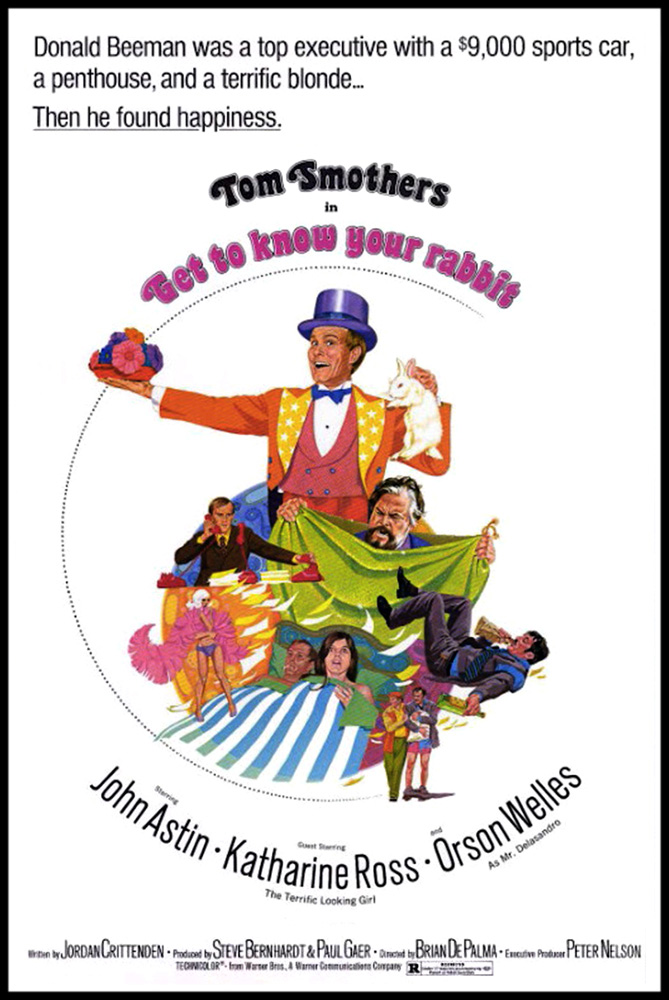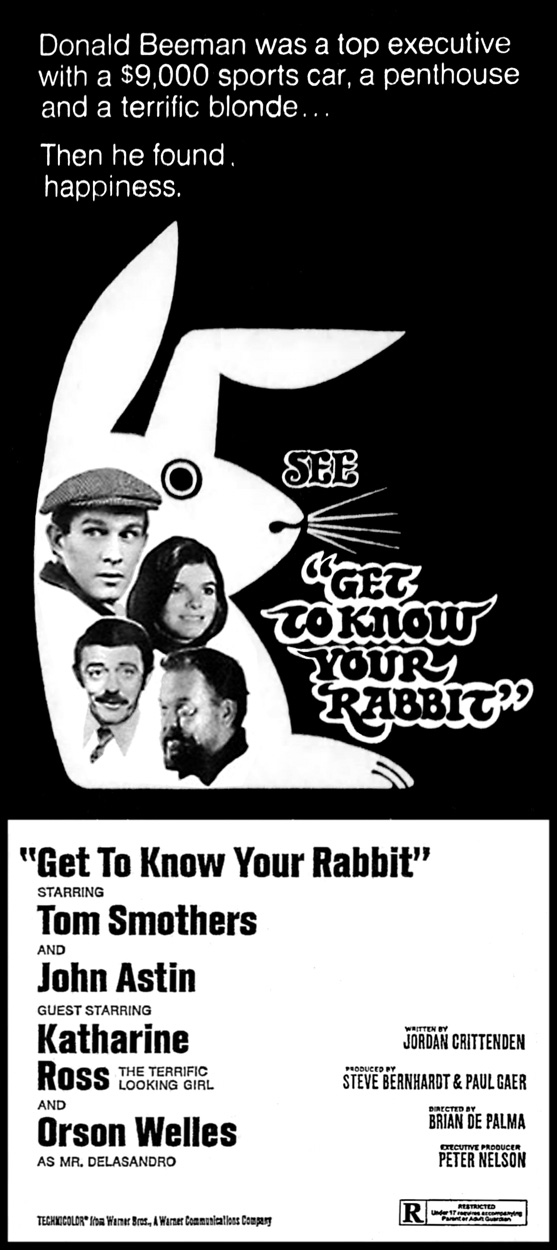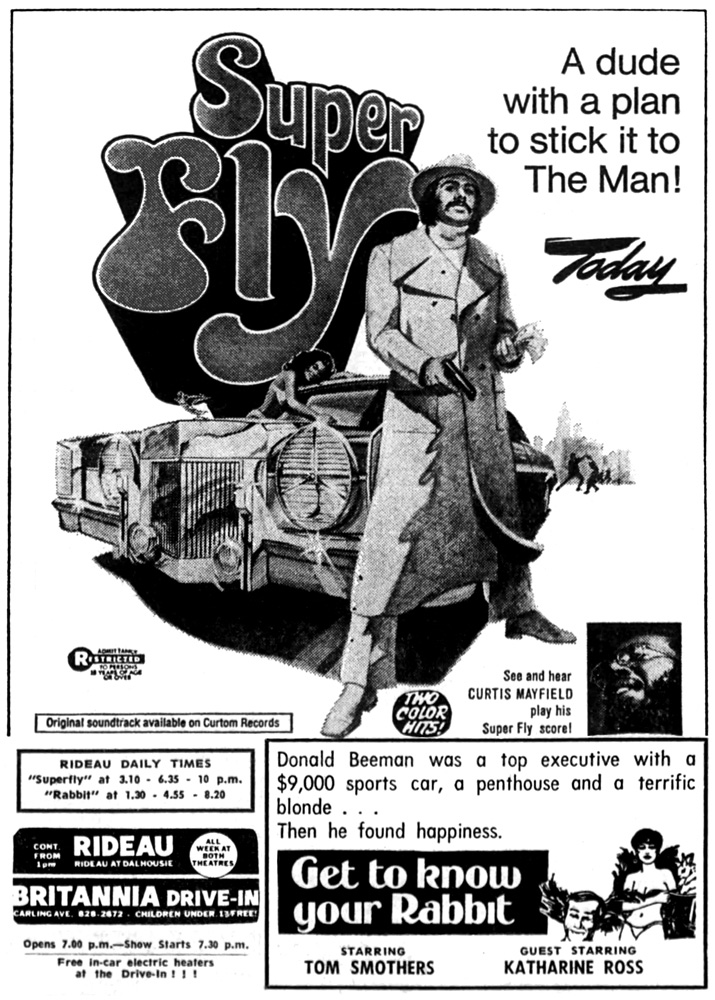|
GET TO KNOW YOUR RABBIT (1972).
 The concept of a major Hollywood studio scooping up a hot young indie director is fairly commonplace nowadays, but way back in the early-'70s, Warner Brothers faced the problem of reining in a strong-willed, uncompromising filmmaker when they hired Brian De Palma -- at the time, acclaimed for scathing, shoestring counterculture comedies such as GREETINGS (1968) and HI, MOM! (1970) -- for his first studio feature. Alas, De Palma eventually learned how difficult it was to make an anti-Establishment satire about nonconformity when the mainstream Establishment is footing the bills, with the studio ultimately taking the film away from him, doing a severe re-edit, shelving it for a year, then barely releasing it to theatres. De Palma's career quickly bounced back with a multi-picture deal with Pressman-Williams Enterprises (which led to SISTERS and PHANTOM OF THE PARADISE) and after viewing the re-cut RABBIT, he stated, "It was all out of shape and proportion, and my vision was completely distorted." Yet despite its disjointed tone and clumsy characterization, this is a fascinating project littered with inspired ideas and wonderfully absurd moments... Hot off of his successful and controversial THE SMOTHERS BROTHERS COMEDY HOUR series, Tom Smothers (who hoped that this vehicle would make him a major movie star... HA!) plays Donald Beeman,
The concept of a major Hollywood studio scooping up a hot young indie director is fairly commonplace nowadays, but way back in the early-'70s, Warner Brothers faced the problem of reining in a strong-willed, uncompromising filmmaker when they hired Brian De Palma -- at the time, acclaimed for scathing, shoestring counterculture comedies such as GREETINGS (1968) and HI, MOM! (1970) -- for his first studio feature. Alas, De Palma eventually learned how difficult it was to make an anti-Establishment satire about nonconformity when the mainstream Establishment is footing the bills, with the studio ultimately taking the film away from him, doing a severe re-edit, shelving it for a year, then barely releasing it to theatres. De Palma's career quickly bounced back with a multi-picture deal with Pressman-Williams Enterprises (which led to SISTERS and PHANTOM OF THE PARADISE) and after viewing the re-cut RABBIT, he stated, "It was all out of shape and proportion, and my vision was completely distorted." Yet despite its disjointed tone and clumsy characterization, this is a fascinating project littered with inspired ideas and wonderfully absurd moments... Hot off of his successful and controversial THE SMOTHERS BROTHERS COMEDY HOUR series, Tom Smothers (who hoped that this vehicle would make him a major movie star... HA!) plays Donald Beeman,  a rising young corporate pawn who abruptly walks out on his high-pressure marketing analyst job in order to become a tap-dancing magician. Promptly ditched by his sexy yet materialistic fiancée (Suzanne Zenor -- despite her blonde bimbo appearance, an ex-assistant professor of Latin and Greek at Indiana's DePauw University), Donald rents a room at a fleabag downtown flophouse, swaps his suit for "seedy" new threads and takes magic lessons from the demanding Mr. Delasandro (Orson Welles, seemingly half in the bag). All the while, Beeman is followed by desperate old boss Mr. Turnbull (John Astin), who refuses to accept Donald's resignation, obsessively pesters Donald to return to work and ends up a (sans-toupee) wino for his effort. All Donald wants is to do what makes him happy -- hitting the road with his rabbit cohort and performing at shitty small-town bars and strip-clubs -- but De Palma illustrates with sly, cynical wit how even the best intentions can be appropriated and commercialized, after Smothers discovers his tap-dancing magician lifestyle has been twisted into a cookie-cutter corporate cult ("living life at the gut level") populated by burnt-out businessmen tired of the rat race. And while De Palma's proposed conclusion would've been remarkably dark and bloody (e.g., Donald graphically slaughtering his rabbit on live TV, in order to self-sabotage his reputation), the studio's eventual, slapped-together ending is both incomprehensible and insipidly uplifting. Jordan Crittenden's scattershot script is littered with amusingly offbeat sequences and often have little to do with the primary storyline (Allen Garfield as abrasive brassiere fetishist Vic? A long-running "party" consisting of 50 very sedate people silently crammed into one tiny, smoke-filled hotel room? A nutjob airline pilot a rising young corporate pawn who abruptly walks out on his high-pressure marketing analyst job in order to become a tap-dancing magician. Promptly ditched by his sexy yet materialistic fiancée (Suzanne Zenor -- despite her blonde bimbo appearance, an ex-assistant professor of Latin and Greek at Indiana's DePauw University), Donald rents a room at a fleabag downtown flophouse, swaps his suit for "seedy" new threads and takes magic lessons from the demanding Mr. Delasandro (Orson Welles, seemingly half in the bag). All the while, Beeman is followed by desperate old boss Mr. Turnbull (John Astin), who refuses to accept Donald's resignation, obsessively pesters Donald to return to work and ends up a (sans-toupee) wino for his effort. All Donald wants is to do what makes him happy -- hitting the road with his rabbit cohort and performing at shitty small-town bars and strip-clubs -- but De Palma illustrates with sly, cynical wit how even the best intentions can be appropriated and commercialized, after Smothers discovers his tap-dancing magician lifestyle has been twisted into a cookie-cutter corporate cult ("living life at the gut level") populated by burnt-out businessmen tired of the rat race. And while De Palma's proposed conclusion would've been remarkably dark and bloody (e.g., Donald graphically slaughtering his rabbit on live TV, in order to self-sabotage his reputation), the studio's eventual, slapped-together ending is both incomprehensible and insipidly uplifting. Jordan Crittenden's scattershot script is littered with amusingly offbeat sequences and often have little to do with the primary storyline (Allen Garfield as abrasive brassiere fetishist Vic? A long-running "party" consisting of 50 very sedate people silently crammed into one tiny, smoke-filled hotel room? A nutjob airline pilot  who climbs up into a tree and needs to be coaxed down by the police? Plus Donald's brief reunion with his parents takes place, inexplicably, inside a closed wardrobe?! ). But while certainly odd, it's never particularly funny and the characters end up one-dimensional cartoons. Smothers displays all the personality of processed cheese spread, so playing a good-natured but vapid naif is an easy fit; a post-BUTCH CASSIDY/THE GRADUATE Katharine Ross is utterly wasted as an airheaded "terrific looking girl," who's also Beeman's biggest fan; while Astin brings his usual mischievous charm to what could've been a scheming, annoying role. In brief supporting roles, look for Bob Einstein (a.k.a. stuntman Super Dave Osborne, as well as an Emmy-winning writer for THE SMOTHERS BROTHERS COMEDY HOUR) as a cop, M. Emmet Walsh as a curious bystander and Charles Lane as Donald's dad. Featuring playful cinematography by John Alonzo (VANISHING POINT, CHINATOWN and later reuniting with De Palma for SCARFACE) -- no surprise, peppered with De Palma's now-trademark split-screens and intricate tracking shots -- GET TO KNOW YOUR RABBIT is ambitious, eccentric but also frustratingly uneven. who climbs up into a tree and needs to be coaxed down by the police? Plus Donald's brief reunion with his parents takes place, inexplicably, inside a closed wardrobe?! ). But while certainly odd, it's never particularly funny and the characters end up one-dimensional cartoons. Smothers displays all the personality of processed cheese spread, so playing a good-natured but vapid naif is an easy fit; a post-BUTCH CASSIDY/THE GRADUATE Katharine Ross is utterly wasted as an airheaded "terrific looking girl," who's also Beeman's biggest fan; while Astin brings his usual mischievous charm to what could've been a scheming, annoying role. In brief supporting roles, look for Bob Einstein (a.k.a. stuntman Super Dave Osborne, as well as an Emmy-winning writer for THE SMOTHERS BROTHERS COMEDY HOUR) as a cop, M. Emmet Walsh as a curious bystander and Charles Lane as Donald's dad. Featuring playful cinematography by John Alonzo (VANISHING POINT, CHINATOWN and later reuniting with De Palma for SCARFACE) -- no surprise, peppered with De Palma's now-trademark split-screens and intricate tracking shots -- GET TO KNOW YOUR RABBIT is ambitious, eccentric but also frustratingly uneven.
© 2017 by Steven Puchalski.

|